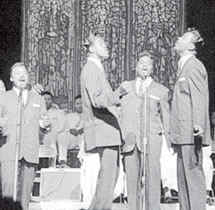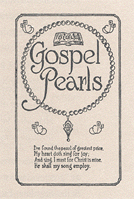|
Black Gospel Music: A Tradition of Excellence
| One of the sources
of black gospel music was the black "jubilee" groups that were formed
in colleges primarily located in the Southeast United States.
These groups employed quartet singing with four-part
harmony. One of the earliest and certainly the most successful
of these groups was the Fisk University Jubilee singers, a male quartet that
sang |
 |
Negro spirituals. The jubilee
style of singing continued, while evolving, well into the 1940s.
Another early
source of Negro gospel music, was the work that was
accomplished by Charles Albert Tindley (1851-1933), a
Philadelphia preacher who composed nearly 50 hymns,
including such standards as Stand By Me, Nothing
Between, Leave it There, and the important We'll Understand
it Better By and By, composed in 1905.
Meanwhile, another tradition of church singing and composition
sprang forth from the birth of Pentecostalism that occurred in
the Azusa Street Revival in Los Angeles a year later. This
important outpouring of divine spirit spawned a new music,
called sanctified singing, and was
pioneered by such people as Arizona Dranes, Rosetta Tharpe, Lucie
Campbell, W. Herbert Brewster and Kenneth
Morris, then reached a
zenith in the 1930s when Thomas A. Dorsey in conjunction with such singers as
Roberta Martin, Mahalia Jackson, Robert Anderson and Sally
Martin, gave birth to a new style of gospel music that was developed in Chicago and in other
Midwestern and Eastern cities.
|

|
In
1921, The National Baptist Convention published Gospel
Pearls, the first book of songs published by
a black congregation that used the name
"gospel" in relation to the newly evolving
style of Negro sacred music that would later be
known as Gospel Music. The book included
songs by Charles Albert Tindley, Lucie Campbell, and
Thomas A. Dorsey.
|
In the 1940s, the
jubilee quartets evolved into the harder singing style of such groups as the Blind Boys of Mississippi,
the Spirit of Memphis, the Soul Stirrers, and the Sensational Nightingales.
During the
1970s, black gospel music moved primarily into another
direction. Pioneered by the great gospel singer James Cleveland
and based on his work with Thomas A.
Dorsey, this movement was called the
Mass Choir Movement. This movement produced some great in
addition to some mediocre music into the 1980s, as black gospel music began
to more and more mimic the soul music of the secular world.
Clearly the great Golden Era of Black Gospel Music was over. Except for the few older groups that continued the older styles,
what was originally black gospel music had been all but
obliterated by the 1990s, and now what you will find in the
record stores, and called "gospel music," has little
or no resemblance to the original, just as contemporary country
music has little or no resemblance to the country music of the
1950s and 1960s, and contemporary jazz has little or no resemblance
to the jazz of bygone years. Styles of music peak,
then dissolve, that is why it is important that we capture
the music at its peak, then relish it for years to
come...something we can now only do because of
technology
The DoveSong Positive Music Archives focus on the
great black gospel music up through the 1960s in addition to the
artists
that have maintained the traditions of uplifting music such
as Andre Crouch and Edwin Hawkins in their earlier
years, Slim and the Supreme Angels, the Williams
Sisters and the Canton Spirituals.
Books
How
Sweet the Sound: The Golden Age of Gospel
Hardback
The Golden Age of Gospel
Paperback
by Horace Clarence Boyer
Elliot & Clark Publishing, 1995
If
you want to know about black gospel music, we highly recommend this book.
We thank Mr. Boyer for this fine work, and the black gospel
section of the DoveSong website has benefited by it.
The
Gospel Sound: Good News and Bad Times
by Anthony Heilbut
Limelight Editions, New York
Editions in 1971, 1975, 1985 and 1992
This
is an informative and the 'classic' book about black gospel
music.
Blues
and Gospel Records (1890-1943)
by Robert M. W. Dixon
This
is an exhaustive discography
Gospel
Records: A Black Gospel Discography (1943-1969)
by Cedric J. Hayes
The
'bible' for collectors of Golden-Era Gospel.
Virginia's
Blues, Country, & Gospel Records 1902-1943: An Annotated
Discography
by Kip Lornell
Kip
is an expert in the field of gospel music, and we owe much
to him for his writings and also for his personal advice and
contribution in creating the DoveSong gospel music archives.
Happy
in the Service of the Lord
by Kip Lornell
The University of Tennessee Press, 1988, 1995
Mr Lornell is a well-known and respected
authority on American music. This book is about the Gospel
Quartets of Memphis. The first chapter One Hundred Years
of Singing in Harmony is the first history written
about Traditional Black Quartet Music.
DoveSong
MP3 Library
->
Gospel
Music in the DoveSong MP3 Library
Dedication
by
Don Robertson
This
page is dedicate to our friend Barksdale, proprietor of
Barky's Spirituals in Richmond, Virginia. The first time that
we walked into Barky's store on Broad Street in 1995 was
the first time that we truly felt the spirit of this wonderful
music, the clear and anointed spirit of sanctified black people, and the
spirit of this wonderful man and his ministry. Every hour that
we spent in this store was a learning experience, and everyone
that we met there was an inspiration to us. It was from this store
that our paths through black gospel music and into the black
sanctified churches of Richmond, Virginia and Washington DC
began. And this has been one of the truly important journeys
of our lives.
Barky's
Spirituals
18 East Broad Street
Richmond VA 23219
(804) 643-1987
|
|

